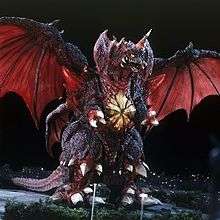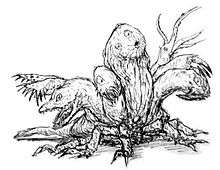Destoroyah
Destoroyah (Japanese: デストロイア, Hepburn: Desutoroia) is a kaiju who first appeared in Toho's 1995 film Godzilla vs. Destoroyah.
| Destoroyah | |
|---|---|
| Godzilla film series character | |
 | |
| First appearance | Godzilla vs. Destoroyah (1995) |
| Created by | Takao Okawara Kazuki Ōmori |
| Portrayed by | Ryo Hariya Eiichi Yanagida |
| Designer | Minoru Yoshida |
| In-universe information | |
| Species | Mutated crustacean |
Overview
Destoroyah originated as a colony of microscopic Precambrian crustaceans that had been awakened and mutated in Tokyo Bay when the Oxygen Destroyer was detonated to kill the original Godzilla in 1954. In 1996, the Destoroyahs eventually mature into man-sized creatures which repel a JSDF assault. The Destoroyahs later combine into a flying form which fights Godzilla Junior. Destoroyah is defeated, but then morphs into an even larger form that is significantly larger than Godzilla and towers over Junior. The creature proceeds to kill Godzilla Junior and faces Godzilla in Haneda Airport, but is finally killed through the combined efforts of Godzilla and the army.[1]
Development

In conceptualizing Godzilla's final adversary, screenwriter Kazuki Ōmori initially proposed having the current Heisei Godzilla fight Ghost Godzilla, the specter of the original 1954 Godzilla, though this idea was scrapped, as Godzilla had already fought several doppelgängers (Biollante, Mechagodzilla and SpaceGodzilla). It was however decided to maintain references to the original film by bringing back the Oxygen Destroyer, the weapon that killed the first Godzilla.[2] The character was initially going to be named "Barubaroi", though this was rejected on account of it sounding too similar to Berber, and thus could have been considered offensive.[3] The Barubaroi designs were much more squid-like than the finalized Destoroyah look, though they shared Destoroyah's trait of surpassing Godzilla in height.[4]
All of Destoroyah's forms were designed by Minoru Yoshida, who'd been instructed to make the creature a crustacean. His design for Destoroyah's final form was given to illustrator Noriyoshi Ohrai, who incorporated it into the movie poster. Ohrai's depiction was later used as the basis for the 3D model used in constructing the creature's suit.[5]
Composer Akira Ifukube had initially wanted to give each of Destoroyah's forms their own motif, though he subsequently chose to give them all the same theme. He chose not to use the Oxygen Destroyer theme from the original 1954 film, as he felt that the theme expressed the tragedy of the weapon's creator, and thus was inappropriate for a monster.[6]
Reception
Along with the film receiving positive reviews, Destoroyah is often considered to be one of the best Godzilla villains. Miles Imhoff of Toho Kingdom called Destoroyah "perhaps the most heartless and cruel of any kaiju to ever exist." He said "the props and suit look amazing, and are really an excellent choice for Godzilla's final Heisei foe. The reddish hues, the jagged features, and the demonic appearance of the many forms of Destoroyah are handled nicely. In fact, its wild and deadly features, coupled with its personality and several stages, can easily be seen as a loose remake of Hedorah. Destoroyah's many forms are portrayed as vicious, but it is the final form that is shown to be truly cold. The portrayal of its ruthless murder of Junior is a form of cruelty truly unseen since the vicious tooth-and-claw battles of the latter Showa entries, and it is this one act that best sums up the character Destoroyah as a whole."[7] Complex listed the character as No. 3 on its "The 15 Most Badass Kaiju Monsters of All Time" list. [8] Conversely, Godzilla historian Steve Ryfle described Destoroyah as a "laughable" mix of the Predator and SpaceGodzilla which "should be placed alongside Megalon and Gigan in the back rooms of the Toho monster gallery."[2] Destoroyah was one of the inspirations behind the name of Japanese heavy metal band Destroya.[9]
Appearances
Films
- Godzilla vs. Destoroyah (1995)
Television
- Godzilla Island (1997)
Video games
- Godzilla Trading Battle (PlayStation - 1998)
- Godzilla: Destroy All Monsters Melee (GCN, Xbox - 2002/2003)
- Godzilla: Save the Earth (Xbox, PS2 - 2004)
- Godzilla: Unleashed (Wii, PS2 - 2007)
- Godzilla Unleashed: Double Smash (NDS - 2007) as equal Playable/Boss
- Godzilla (PS3, PS4 - 2014/2015)
- Godzilla Defense Force (2019)
Literature
- Godzilla vs. Destoroyah (manga - 1995)
- Godzilla: Legends (comic - 2011-2012)
- Godzilla: Rulers of Earth (comic - 2013-2015)
- Godzilla: Cataclysm (comic - 2014)
- Godzilla in Hell (comic - 2015)
- Godzilla: Oblivion (comic - 2016)
References
| Wikimedia Commons has media related to Destoroyah. |
- Godzilla vs. Destoroyah (1995). Directed by Takao Okawara. Toho
- Ryfle, S. (1998). Japan’s Favorite Mon-Star: The Unauthorized Biography of the Big G. Toronto: ECW Press. pp. 305–16. ISBN 1550223488.
- 東宝特撮映画大全集 ["Toho special effects movie Complete Works"], Village Books, 2012, pp. 248-251. ISBN 9784864910132
- Kawakita, Koichi (2012). 平成ゴジラパーフェク [Heisei Godzilla Perfection] (in Japanese). Dengeki Hobby Books. ISBN 4048861190.
- David Milner, "Koichi Kawakita Interview II", Kaiju Conversation (December 1995)
- David Milner, "Akira Ifukube Interview III", Kaiju Conversations (December 1995)
- Miles Imhoff, "Review: Godzilla vs. Destoroyah (1995)", Toho Kingdom (April 16, 2005)
- Josh Robertson, "The 15 Most Badass Kaiju Monsters of All Time", Complex (May 18, 2014)
- "DESTROSE Mina隊長 登場!". HMV Japan (in Japanese). December 14, 2010. Retrieved May 31, 2020.